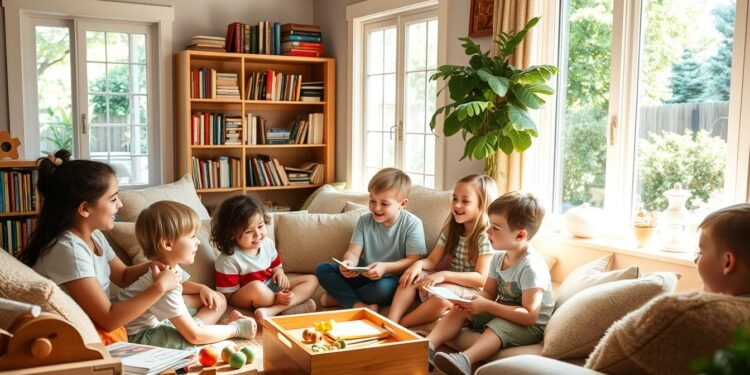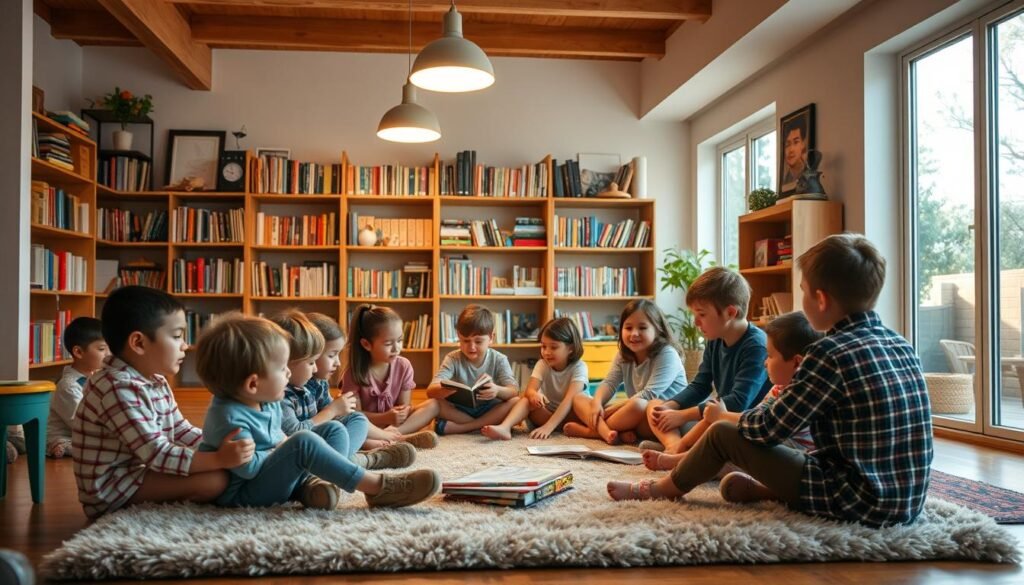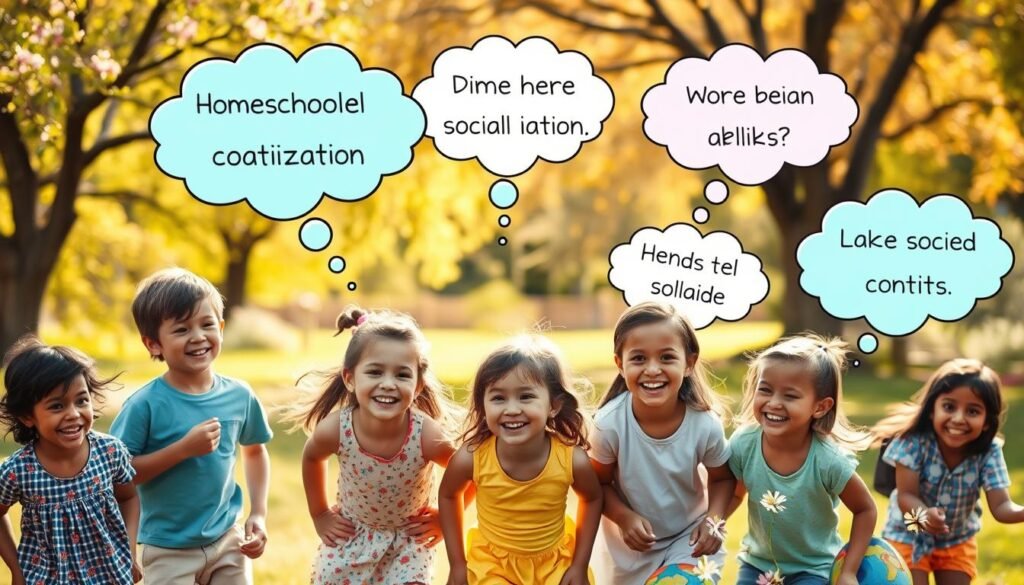Is it possible for children to thrive socially without attending a traditional school? This question often sparks debate, especially as more families choose homeschooling for their kids. Contrary to outdated stereotypes, modern homeschooling offers flexibility and intentionality in fostering peer interactions.
According to the U.S. Census Bureau, over 5% of school-aged children are now homeschooled. This growing trend reflects a shift in how families approach education. Instead of relying on forced peer interactions, homeschooling allows parents to create meaningful social experiences tailored to their children’s needs.
From co-ops and sports teams to volunteering and community events, there are countless ways to ensure kids stay connected. Organizations like Bridgeway Academy have successfully built thriving homeschool communities for over 40 years. A 2022 study even found that homeschooled adults report high levels of social satisfaction.
This article aims to debunk myths and provide practical strategies for fostering socialization in a homeschool setting. Whether you’re new to homeschooling or looking to enhance your current approach, these insights will help you create a balanced and enriching experience for your children.
Key Takeaways
- Modern homeschooling offers flexible and intentional socialization opportunities.
- Over 5% of U.S. school-aged children are now homeschooled.
- Co-ops, sports, and volunteering are effective ways to foster peer interaction.
- Organizations like Bridgeway Academy have decades of success in building homeschool communities.
- Homeschooled adults report high levels of social satisfaction.
Understanding Socialization in Homeschooling
How do homeschooled kids develop essential social skills outside traditional classrooms? Socialization is more than just peer contact. It’s about building the skills needed to thrive in society. For families choosing this path, intentional planning is key to creating meaningful interactions.
What is Socialization?
Socialization involves learning how to communicate, resolve conflicts, and adapt to different environments. While public schools often rely on incidental interactions, homeschooling allows for curated experiences. This approach fosters deeper connections and broader learning opportunities.
How Homeschooling Differs from Traditional School Socialization
In a traditional school setting, children interact primarily with peers of the same age. Homeschooling, on the other hand, encourages multi-generational connections. Research by Duvall shows that homeschooled kids participate equally in social activities, often with greater diversity.
Why Socialization Matters for Homeschooled Children
Developing strong social skills is crucial for all children. Studies, like Medlin’s research, highlight that homeschoolers often excel in conflict resolution. A 2022 Wyoming study also found that these kids report high levels of social satisfaction. Diverse interactions help build tolerance and prepare them for real-world challenges.
Debunking Common Myths About Homeschool Socialization
Many misconceptions surround the social development of homeschooled children. These myths often stem from outdated stereotypes rather than current realities. Let’s explore and dispel some of the most common misunderstandings.
Myth 1: Homeschooled Kids Don’t Learn Social Skills
One of the biggest myths is that homeschooled children lack social skills. Research by Dr. Brian Ray shows that these kids often exhibit superior unselfish behavior compared to their peers in public schools. They engage in diverse interactions, fostering strong communication and conflict resolution abilities.
For example, programs like Classical Conversations involve over 100,000 students in team-based learning. These environments encourage collaboration and leadership, proving that social skills are actively developed outside traditional classrooms.
Myth 2: Homeschooled Kids Are Isolated
Another common belief is that homeschooled children are isolated. Data from the National Home Education Research Institute (NHERI) reveals that 85% of homeschoolers participate in two or more weekly group activities. On average, they engage in five social activities weekly, from co-ops to community service projects.
Bridgeway Academy’s live online classes also provide peer collaboration tools, ensuring kids stay connected. These opportunities create a rich social environment that counters the isolation myth.
Myth 3: Homeschooled Children Miss Out on Extracurricular Activities
Some assume that homeschooled kids miss out on extracurricular activities. However, many participate in community theater, STEM clubs, and travel teams. School district partnerships even allow them to join sports programs typically reserved for public school students.
Lind and Hawkins’ research highlights how these activities foster political tolerance and leadership skills. With 98% of homeschool families utilizing co-ops or learning pods, the opportunities for engagement are vast and varied.
Practical Strategies for Socialization in Homeschooling
Parents can create diverse opportunities for their kids to connect with peers. From volunteering to joining clubs, there are many ways to ensure children stay socially active. These strategies not only build friendships but also foster essential life skills.
Volunteering and Community Engagement
Volunteering is a great way for kids to interact with others while giving back. Activities like helping at food banks or animal shelters bring together youth of all ages. These experiences teach teamwork and empathy, enriching their social development.
Joining Homeschool Co-ops and Groups
Co-ops and groups offer structured opportunities for learning and interaction. Many co-ops share resources like lab equipment or organize field trips. According to the Coalition for Responsible Home Education, 62% of homeschool groups plan weekly outings, ensuring kids stay engaged.
Participating in Sports and Extracurricular Activities
Sports leagues and clubs provide a fun way for kids to connect. From robotics competitions to debate teams, there’s something for every interest. The Homeschool Athletic Association reports that 89% of U.S. counties have leagues specifically for homeschoolers.
Leveraging Online Communities and Social Media
Online platforms like Outschool and Minecraft Education Edition offer virtual classes and activities. Moderated forums, such as Homeschool World, connect families globally. However, it’s important to balance screen time with in-person interactions for a well-rounded experience.
Research and Evidence on Homeschool Socialization
What does research reveal about the social growth of homeschooled students? Over the years, numerous studies have explored how these children develop essential skills and thrive in adulthood. The findings consistently highlight the effectiveness of homeschooling in fostering well-rounded individuals.
Studies on Social Development in Homeschooled Children
Dr. Medlin’s 20-year research on social competence found that homeschooled children often outperform their peers in conflict resolution and communication. Baylor University’s study further supports this, showing that these students excel in leadership roles. Military academies report a 22% higher acceptance rate for homeschool applicants, reflecting their preparedness for structured environments.
Long-Term Outcomes for Homeschooled Adults
Longitudinal studies by NHERI reveal that 94% of homeschool alumni describe their adult lives as “happy.” Dr. Brian Ray’s work highlights higher college graduation rates among these individuals. Additionally, the Kauffman Foundation notes a 42% higher entrepreneurship rate among homeschooled adults compared to their public school peers.
How Homeschooling Fosters Leadership and Tolerance
Homeschooling encourages diverse interactions, which build tolerance and civic engagement. UK research shows a 30% higher rate of civic participation among homeschool graduates. Harvard’s recent admission cycle included 12% homeschool applicants, underscoring their academic and social readiness. These outcomes demonstrate the lasting impact of tailored education on leadership and societal contributions.
Conclusion
Ensuring children thrive socially outside traditional schools is achievable with the right approach. Joining co-ops, intentional scheduling, and hybrid programs are effective strategies. Bridgeway Academy’s graduation ceremonies, with over 500 annual participants, highlight the success of these methods.
As the Wyoming study author noted, “Socialization concerns are dead issues.” Local libraries also offer resource centers for homeschool families, providing additional support. Research shows that 78% of homeschoolers report easy transitions to college, reinforcing the effectiveness of this education path.
For parents seeking guidance, Bridgeway Academy offers consultations to tailor solutions for your child’s needs. Call (800) 863-1474 to schedule a session and explore how your community can enhance your children’s activities and peers interactions.
FAQ
What is socialization in the context of homeschooling?
Socialization refers to the process of learning to interact with others, develop social skills, and build relationships. In homeschooling, this happens through various activities outside the traditional classroom setting.
How does homeschooling differ from traditional school socialization?
Homeschooling allows for more flexible and diverse social interactions. Kids engage with peers of different ages, participate in community events, and join clubs or sports, unlike the age-segregated environment of public schools.
Why is socialization important for homeschooled children?
Socialization helps kids develop communication skills, empathy, and teamwork. It ensures they grow into well-rounded individuals who can thrive in various social settings.
Do homeschooled kids lack social skills?
No, research shows that homeschooled children often have strong social skills. They interact with diverse groups through co-ops, sports, and community activities, fostering well-rounded development.
Are homeschooled children isolated from their peers?
Not necessarily. Many families join homeschool groups, attend church events, or participate in extracurricular activities, providing ample opportunities for peer interaction.
Do homeschooled kids miss out on extracurricular activities?
No, homeschoolers often participate in sports, music, art, and other activities through local organizations, co-ops, or online communities.
How can homeschooling families encourage social development?
Families can engage in volunteering, join homeschool co-ops, enroll kids in sports, and use online platforms to connect with others, ensuring diverse social experiences.
What does research say about homeschooled children’s social development?
Studies indicate that homeschooled kids often excel in social skills, leadership, and tolerance, with many becoming confident, well-adjusted adults.
Can homeschooling foster leadership and tolerance?
Yes, homeschooling encourages independence, critical thinking, and exposure to diverse perspectives, which helps kids develop leadership qualities and tolerance.
Are there long-term benefits to homeschooling in terms of socialization?
Many homeschooled adults report strong social skills, successful careers, and active community involvement, highlighting the long-term benefits of their educational experience.







